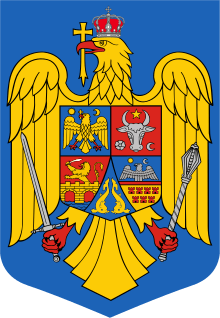Romanian parliamentary reform referendum, 2009
 |
| This article is part of a series on the politics and government of Romania |
|
A referendum on modifying the size and structure of the Parliament from the current bicameral one with 137 senators and 334 deputies to a unicameral one with a maximum of 300 seats was held in Romania on 22 November 2009, at the same time as the first round of the 2009 presidential election. Electors were asked two questions on two separate ballots:
- Do you agree to Romania's adoption of a unicameral Parliament?
- Do you agree to the reduction of the number of parliamentarians to a maximum of 300 persons?
According to the Romanian law, in order for the referendum to be validated, 50% plus one of the total number of eligible voters (i.e. of the number of people that appear on the official electoral list) had to cast their vote. According to the final tally by the Romanian Central Electoral Commission, 9,320,240 of the 18,293,277 eligible voters participated, thus validating the referendum with a turnout rate of 50.95%.[1]
Background
Incumbent President Traian Băsescu signed the decree to hold this plebiscite on 22 October 2009.[2] The previous day, on 21 October, the Romanian Parliament in a consultative vote recommended against the President's proposed referendum, but, according to Romanian referendum law, Parliament's resolution was not binding.
In response to the referendum call, the National Liberal Party, in opposition to incumbent Băsescu, introduced a bill which would downsize Parliament to a total of 316 representatives – 99 senators and 217 deputies.[3]
After counting more than 90% of the votes, the authorities announced partial results, including the information that 50,16% of the electorate expressed their votes making the result of the referendum valid.[4][5]
Results
| Choice | Votes | % |
|---|---|---|
| |
6,740,213 | 77.78 |
| No | 1,925,209 | 22.22 |
| Valid votes | 8,665,422 | 92.97 |
| Invalid or blank votes | 654,818 | 7.03 |
| Total votes | 9,320,240 | 100.00 |
| Registered voters and turnout | 18,293,277 | 50.95 |
| Source: Biroul Electoral Central[6] | ||
| Choice | Votes | % |
|---|---|---|
| |
7,765,573 | 88.84 |
| No | 975,252 | 11.16 |
| Valid votes | 8,740,825 | 93.78 |
| Invalid or blank votes | 579,415 | 6.22 |
| Total votes | 9,320,240 | 100.00 |
| Registered voters and turnout | 18,293,277 | 50.95 |
| Source: Biroul Electoral Central[7] | ||
Effect
After the referendum, from 471, the number of parliamentarians kept growing in Romania, due to lack of any legal limitations. In July 2015, after almost 6 years since the referendum was held, the number of Romanian parliamentarians was 588. No other referendum on optimizing the legislation has been held in Romania since this one. The only one and last referendum (invalidated) was in 2012 for impeaching the president.
References
- ↑ (Romanian) Official results from the Romanian Central Electoral Commission
- ↑ President Traian Basescu inks decree to organize referendum for unicameral Parliament on November 22, Newsin.ro, October 24, 2009. Retrieved October 24, 2009.
- ↑ http://www.setimes.com/cocoon/setimes/xhtml/en_GB/newsbriefs/setimes/newsbriefs/2009/10/23/nb-09
- ↑ (Romanian) 53,52% DINTRE ROMÂNI AU VOTAT LA ALEGERI. REFERENDUMUL VALID
- ↑ (Romanian) Referendumul, validat. Prezenţă de 50,16%
- ↑ (Romanian)"Comunicat: privind rezultatele referendumului național din data de 33 noiembrie 2009 asupra trecerii la un Parlament unicameral" (PDF) (in Romanian). Biroul Electoral Central. 2009-11-25. Retrieved 2009-11-26.
- ↑ (Romanian)"Comunicat: privind rezultatele referendumului național din data de 33 noiembrie 2009 asupra reducerii numărului de parlamentari la maximum 300 de personane" (PDF) (in Romanian). Biroul Electoral Central. 2009-11-25. Retrieved 2009-11-26.